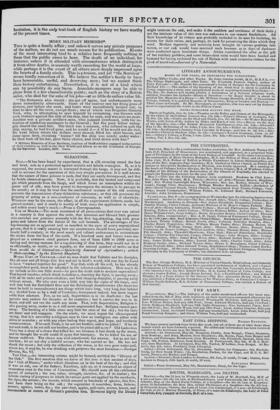MORE MILITARY MEMOIRS*.
Tuts is quite a family affair; and unless it serves any private purposes of the author, we do not see much reason for its publication. Events of the most interesting kind to a relative have frequently nothing in them that the public cares to hear. The death of an individual, for instance, unless it is attended with circumstances which distinguish it from other deaths, is scarcely worth recording for the world at large, while perhaps it is the event of all others most deeply impressed upon the hearts of a family circle. This is a truism, and yet "the Survivor" seems hardly conscious of it. We believe the author's family to have been honourable, useful, and deserving men; but we cannot think their history entertaining. Nevertheless, it is not of a kind which can by possibility do any harm. Anecdote-mongers may be able to glean from it a few characteristic points; such as the story of a British sailor, who died for the sake of his joke—at so little do sailors value life.
"The Britannia also struck : she got off again, but unfortunately went down immediately afterwards. Some of the convoy saw her firing guns of distress, just before she sunk, and boats were immediately hoisted out, in time to save all the crew, except three ; one of which was Brigadier-General York, who, in attempting to save himself by swimming, was thrown with such violence against the side of the ship, that he sank, and was seen no more. Another was a private artillery-man, who jumped overboard, with the intention of rendering assistance to the General ; but the poor fellow unhap. pily shared the same fate. The third was a seaman, who refused to quit the ship, saying, he had lived poor, and he would d— d if he would not die rich. He went below where the dollars were stowed, filled his shirt bosom, and came upon deck, shouting huzza l' till the ship was nearly under water: be then took off his hat, gave three cheers, and went down with her."
* Military Memoirs of Four Brothers, (natives of Staffordshire) engaged in the service of their country, as well in the New World and Africa as on the Continent of Europe. By the Survivor. London, 1829. Sams.


















 Previous page
Previous page